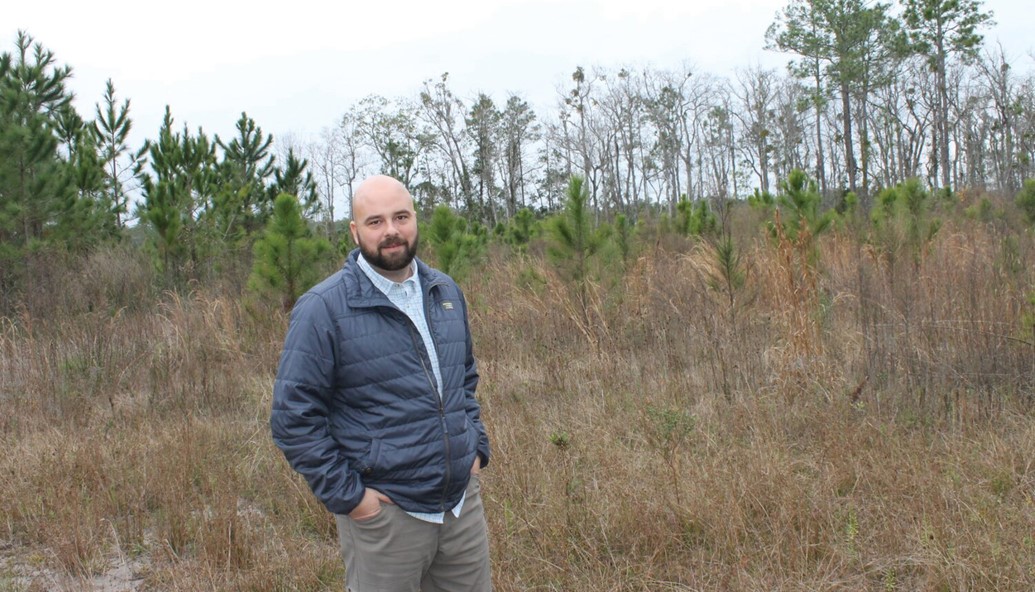January 25, 2024 The Agricola Property: an upcoming innovative community

Full content here
CLAY COUNTY – The Agricola family owns 30,000 acres of timberland forests across Florida, but 3,100 acres just a few miles south of Green Cove Springs have been set aside for something special.
Christophe Agricola stood underneath a cultivated canopy, looking through rows and rows of planted pine trees, and he envisioned something more. The family sometimes sells timberland to state agencies, investors or existing developers. But not this time.
“We thought we would look into our own property, see what could happen, and (attempt) something that would be better,” Agricola said.
The Agricola Property is a proposed planned community that aims to be not merely an ambitious project within county lines but a national model for what modern alternative living could look like – featuring the small-town charm and rural culture of Clay County.
According to one presentation, Agricola would be a walkable, self-contained community developed around a village center featuring mixed-use commercial/residential buildings. Pedestrian trails would integrate economic, residential and agricultural districts – forming not merely a neighborhood, but an “agri-hood.” It would have its own schools, amenities and commercial and residential buildings.
Instead of paying typical HOA fees for lawn maintenance, residents would financially support, participate and enjoy community agriculture.
“The COVID-19 pandemic has affected how we perceive the workforce and housing. There’s now a focus toward lifestyle and hybrid work options,” Agricola said. “People want to live in a community and be a part of it.”
The proposed community will benefit because it will be located near the developing First Coast Expressway.
Their financial assessment estimates that Agricola construction could create more than 4,000 jobs, $7.4 million in ad valorem revenue to Clay County during development and $236 million in ad valorem during the next 25 years.
While the economic and cultural potential is exciting, Agricola said the environment takes precedence. He says he plans to go above and beyond Florida Department of Environmental Protection (FDEP) guidelines by expanding the buffer between development and existing wetlands. FDEP recommends a 30-foot buffer. Agricola is pushing for a 100-foot buffer on average. Agricola views wetlands as a valuable natural resource, not a hindrance.
“We’ve been in Florida, and we’ve seen the growth. Much of the growth has been good for the economy and has helped our family business, too. But there’s been some bad growth as well. We are lucky to live in a state dedicated to conservation. But there is only so much that can be done at the state level,” Agricola said.
Agricola said he understands the importance of environmental conservation. He said his father, Bill Agricola, brokered the deal between the Jennings family and the state of Florida that created Jennings State Forest. This is Agricola’s way of following in his father’s footsteps and leaving his legacy in Clay County.
“Growth is going to happen, but we want to ensure that it is for the better,” he said. “We can put an emphasis on making something that is valuable and sustainable and respectful of nature – not just going ahead and clear-cutting wetlands and placing cookie-cutter housing on top.”
Agricola wants his community to integrate nurturing homes and natural environments. Houses are to be made affordable and with quality. He said that walkability is vital to fostering a sense of community and experiencing surrounding nature. Agricola used the term “free range children” to describe the safety of his community – you can be comfortable that children playing outside, running along the trails or using recreational facilities will be safe.
But there’s no such thing as a foolproof plan, especially in real estate development.
“Even with best-laid plans, you never know what can happen. What we did set us apart, so we went the planned community route. We’re tied to a development agreement that we are bound to and which the county can enforce. We’re not making all these promises and then pulling a bait-and-switch. We are committed to this vision,” Agricola said.
The Agricola team first sat down with county staff three years ago. They are still rezoning their property from “agriculture” to “planned community.” Agricola said they submitted their planned unit development (PUD) to the state and expect to receive feedback next month.
A community workshop is planned for Feb. 27 at 10 a.m. and is open to the public for feedback and suggestions. It'll be held at 10 a.m. in the BCC Meeting Room, 4th floor, Clay County Administration Building, 477 Houston Street, Green Cove Springs, Florida. The final approval is up to the Board of County Commissioners from there.
“We try to be as transparent and open and communicative. We have an open-door policy because it benefits us. Their perspective benefits us. If they have good ideas, we want to incorporate them. We do care. These are our neighbors, and we’ve always tried to be good neighbors,” he said.
The team is eager to get the ball rolling.
“It is easier to sell that vision when they can see it – and that takes time,” Agricola said, referring to commercial investors that would set up shop in the community.
“Unlike most developers, we don’t have a ticking clock hanging over our heads. It would be great to get this as soon as possible, but it depends on the market and reaching out to interested businesses. I don’t have an answer to when we’ll get started – it’ll be when the time is right,” he said.
“We’re timber farmers. We’ve learned to be patient.”
